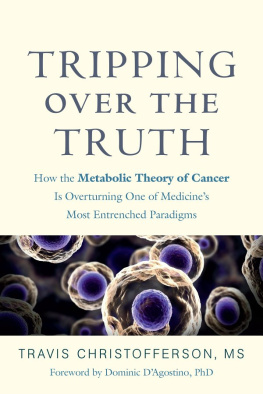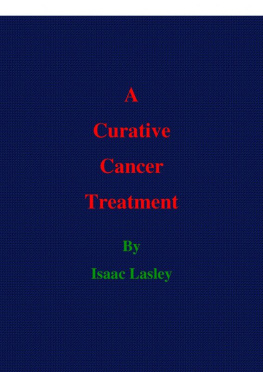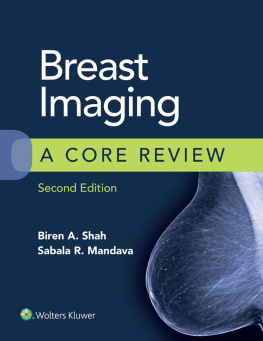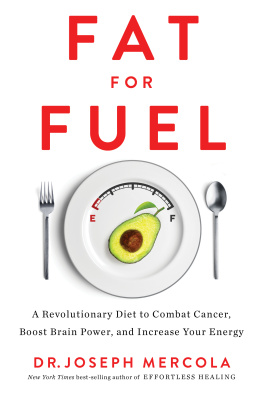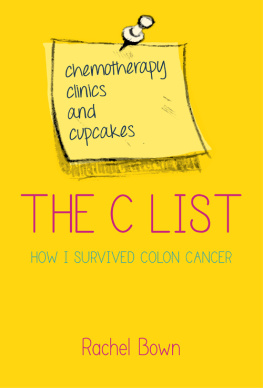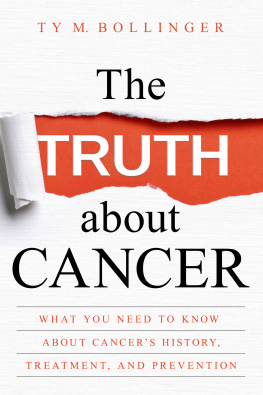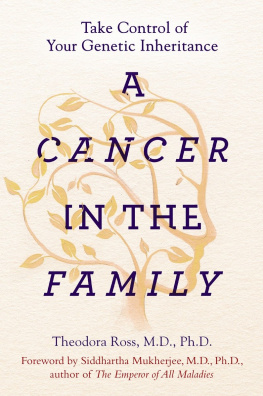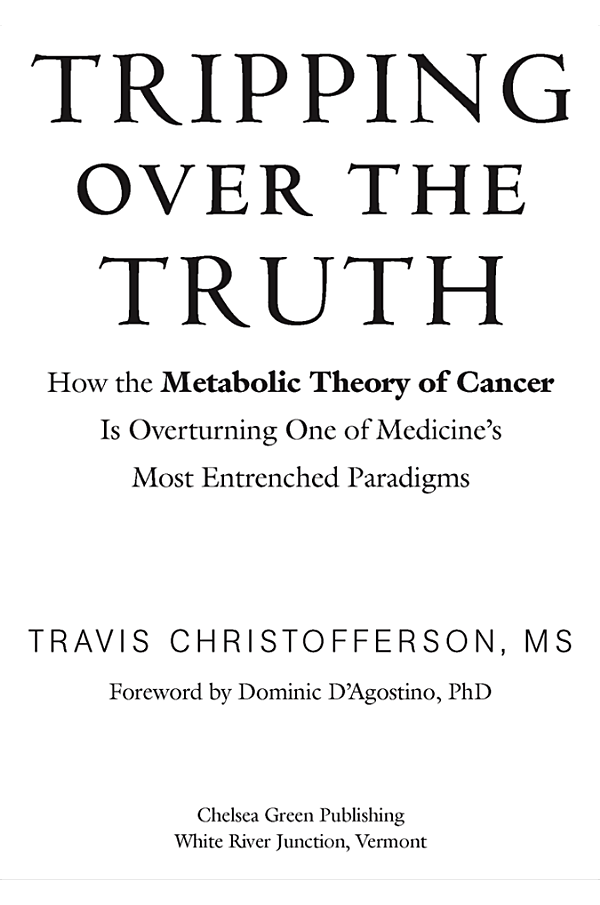Praise for Tripping over the Truth
An iconoclastic, information-rich narrative that boldly challenges our current understanding and treatment of cancer. Christofferson persuasively argues and documents why a restricted calorie, high (good) fat diet should at least be considered for most malignancies. An absolute must-read to understand the history and evolution of present day cancer therapy.
Joseph C. Maroon , MD, author of The Longevity Factor
Phenomenal... required reading for anyone who has cancer or knows someone who has cancer.... I cannot stress its importance enough. Get yourself a copy, and read it.
Dr. Joseph Mercola , founder and director, mercola.com
I absolutely loved Dr. Seyfrieds book, Cancer as a Metabolic Disease , and Dr. Mukherjees book, The Emperor of all Maladies , but it was difficult to get my patients to read these two books to understand the history of cancer and the cancer industry, not to mention the movement from the somatic to the metabolic theory of cancer, both intimidating subjects. Then, along came Travis Christoffersons brilliant, timely, and expertly consolidated book. It reads like a novel and is easy to comprehend for everyone interested in the new conversation around cancer and cancer care. I recommend it to patients, family, friends, and colleagues and refer back to it often.
Dr. Nasha Winters , ND, coauthor of The Metabolic Approach to Cancer
The author takes us on over a hundred-year exciting journey of the research to understand and eradicate this diseaseThis is a great scientific mystery book... is for everyone, but should be read by all physicians that treat cancer. I congratulate the author for a marvelous job and highly recommend this book.
Robert L. Elliot , MD, PhD
Travis Christofferson provides a compelling historical account of how cancer has been misunderstood as a genetic disease when, in fact, it is a type of metabolic disease. Unlike normal cells, which obtain their energy from respiration, cancer cells have damaged respiration and obtain much of their energy from the primitive process of fermentation. Travis describes how the mutations in tumors arise as an effect of respiratory damage and cannot be the cause or drivers of cancer. The information presented in Tripping over the Truth will have profound consequences for how cancer is managed and prevented. Metabolic therapies will be more effective and less toxic than the current gene- or immune-based therapies, and have the potential to significantly improve quality of life and long-term survival for millions of cancer patients worldwide.
Thomas N. Seyfried , PhD, author of Cancer as a Metabolic Disease
Copyright 2017 by Travis Christofferson.
All rights reserved.
No part of this book may be transmitted or reproduced in any form by any means without permission in writing from the publisher.
Project Manager: Patricia Stone
Editor: Makenna Goodman
Proofreader: Jennifer Lipfert
Indexer: Shana Milkie
Designer: Melissa Jacobson
Printed in the United States of America.
First printing January, 2017.
10 9 8 7 6 5 4 3 2 117 18 19 20 21
Our Commitment to Green Publishing
Chelsea Green sees publishing as a tool for cultural change and ecological stewardship. We strive to align our book manufacturing practices with our editorial mission and to reduce the impact of our business enterprise in the environment. We print our books and catalogs on chlorine-free recycled paper, using vegetable-based inks whenever possible. This book may cost slightly more because it was printed on paper that contains recycled fiber, and we hope youll agree that its worth it. Chelsea Green is a member of the Green Press Initiative ( www.greenpressinitiative.org ), a nonprofit coalition of publishers, manufacturers, and authors working to protect the worlds endangered forests and conserve natural resources. Tripping over the Truth was printed on paper supplied by Thomson-Shore that contains 100% postconsumer recycled fiber.
Library of Congress Cataloging-in-Publication Data
Names: Christofferson, Travis, author.
Title: Tripping over the Truth : how the metabolic theory of cancer is overturning one of medicines most entrenched paradigms / Travis Christofferson.
Other titles: Tripping over the truth
Description: White River Junction, Vermont : Chelsea Green Publishing, [2017] | Revision of: Tripping over the truth. 2014. | Includes bibliographical references and index.
Identifiers: LCCN 2016051393| ISBN 9781603587297 (hardcover) | ISBN 9781603587303 (ebook)
Subjects: LCSH: CancerHistory. | Cancer--Alternative treatment. | CancerPrevention. | BISAC: HEALTH & FITNESS / Diseases / Cancer.
Classification: LCC RC267 .C47 2017 | DDC 616.99/4dc23
LC record available at https://lccn.loc.gov/2016051393
Chelsea Green Publishing
85 North Main Street, Suite 120
White River Junction, VT 05001
(802) 295-6300
www.chelseagreen.com
To Blu
Cancer, above all other diseases, has countless secondary causes. But, even for cancer, there is only one prime cause. Summarized in a few words, the prime cause of cancer is the replacement of the respiration of oxygen in normal body cells by a fermentation of sugar.
Otto H. Warburg
The truth of a theory can never be proven; for one never knows if future experience will contradict its conclusions.
Albert Einstein
Contents
Foreword
In 1971 a cancer diagnosis was a terrifying experience. Patients felt helpless, out of control. Everything in their life was put on hold as they waited, at the mercy of their oncology teamsurgeons, radiation oncologists, chemotherapy nurses. In 2016 how much has really changed?
While many pioneers had been working on curing cancer for over 100 years, in 1971 a final push was taken to attempt to defeat the deadly disease. It was December 23, 1971, and President Richard Nixon was addressing a crowd in the White House State Dining Room to announce the signing of the National Cancer Act, a $1.6 billion, federally funded War on Cancer that was to be spearheaded by the National Cancer Institute (NCI). Although Nixons original plan had been to cut the budget for cancer research, he was pressured by such influential people as health activist Mary Lasker, pediatric pathologist Sidney Farber, and philanthropist Laurance Rockefeller to get this passed as the Christmas present for the American people. Finally, the US government took the first major step toward tackling this issue, and everyone was optimistic of its imminent success. There was an incredible media campaign to advertise this important decision, and it was even declared, It will do more for humanity than any single act the United States has ever taken.
Photos of the notable event show the president and representatives of the House and Senate smiling, including Senator Edward (Ted) Kennedy, who championed the cause in the US Senate. Enthusiasm was high. They were confident that if US scientists and government could split an atom and send a man to the moon, surely they could tackle a common human disease. Some even predicted that cancer would be conquered by the US bicentennial in 1976. Adding to this confidence was the fact that chemotherapies already being implemented for childhood leukemia, spearheaded by Dr. James Holland, had proven very successful and had been celebrated publicly.
Ten years passed quickly, without major advances, and doubts emerged about the progress being made in the War on Cancer. The confidence of the 1970s was being replaced with debates questioning whether it was even possible to beat an enemy that was so mysterious and elusive. Confusion and dispute enveloped even the understanding of the fundamental cause of cancer. The work in the 1930s of Nobel laureate Otto Warburg describing the initial metabolic disturbances in tumors as the trigger of cancer growth was no longer taken seriously enough to direct research efforts. Following his extensive research on tumor metabolism, Otto Warburg stated, Cancer, above all other diseases, has countless secondary causes. But, even for cancer, there is only one prime cause. Summarized in a few words, the prime cause of cancer is the replacement of the respiration of oxygen in normal body cells by a fermentation of sugar. However, despite the evidence for the metabolic origin of cancer, the NCI website ignores this and states that cancer is a genetic disease, even though it has been documented that inherited genetic mutations play a major role in only 5 to 7 percent of all cancers.
Next page
